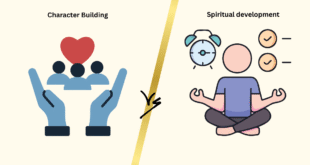By: Dr. Muhammad Younus Khalid
In the grand tapestry of life, we all possess the remarkable ability to shape our destinies and achieve our dreams. However, this journey is not passive; it requires deliberate effort to unlock our fullest potential. This is where the transformative power of self-development comes into play.
Self-development is the process of improving oneself through conscious efforts, aiming to enhance skills, knowledge, and overall well-being. It’s about personal growth, realizing your capabilities, and making deliberate strides toward a more fulfilling life. In this article, we will explore the profound significance of self-development, its importance, and how it can positively impact every aspect of your life.
What is Self-Development?
Self-development, also referred to as personal development, self-improvement, or self-help, is the conscious and purposeful effort to refine one’s skills, character, and overall well-being. It involves a continuous journey of learning, self-awareness, and growth to maximize one’s potential and become the best version of oneself.
Self-development encompasses the development of one’s body, mind, heart, and soul. This holistic process ensures balanced personal growth in every area of life, including professional skills, emotional intelligence, mental clarity, and spiritual awareness.
The History of Self-Development
The journey of self-development spans centuries, deeply rooted in ancient philosophies, religious teachings, and psychological principles. Here’s a brief look at the milestones in the history of self-development:
- Ancient Philosophical Traditions: Greek philosophers like Socrates, Plato, and Aristotle explored ideas related to ethics, self-knowledge, and personal growth, laying the foundation for modern self-development.
- Religious and Spiritual Traditions: Major world religions such as Judaism, Christianity, Islam, Buddhism, and Hinduism have long emphasized inner growth, moral development, and self-improvement.
- The Enlightenment (17th-18th Century): Intellectual movements like Descartes and John Locke promoted individualism, reason, and self-determination, marking a turning point in the development of modern self-help principles.
- Transcendentalism (19th Century): The American transcendentalists, including Ralph Waldo Emerson and Henry David Thoreau, encouraged self-reliance and personal growth through a connection with nature.
- Psychology’s Rise (Late 19th Century): William James and Sigmund Freud revolutionized our understanding of the human mind, contributing significantly to the field of personal growth.
- The Self-Help Movement (20th Century): Figures like Napoleon Hill (“Think and Grow Rich”) and Dale Carnegie (“How to Win Friends and Influence People”) made personal success accessible to millions.
- Humanistic Psychology (20th Century): Abraham Maslow and Carl Rogers emphasized the importance of self-actualization, personal growth, and self-fulfillment in their theories of human development.
- Digital Age (Late 20th Century to Present): The internet has made self-development resources widely accessible through blogs, podcasts, and online courses, significantly expanding its reach.
Why Self-Development is Important
Self-development is essential for a fulfilling life. It empowers you to improve various aspects of your personal and professional existence. Here are some reasons why self-development is crucial:
1. Increased Self-Awareness
Through self-development, you become more aware of your strengths, weaknesses, and core values. This awareness enables better decision-making, clearer life goals, and a more meaningful sense of purpose.
2. Skill Enhancement
Self-development helps enhance your skills in multiple areas, such as communication, time management, and technical skills. These skills increase your effectiveness and adaptability, both personally and professionally.
3. Boosted Confidence
Achieving personal goals boosts your self-confidence and self-esteem. This increased confidence can have a positive impact on your relationships, career, and overall well-being.
4. Adaptability
In today’s rapidly changing world, adaptability is a crucial life skill. Self-development equips you with the ability to embrace change and face challenges with flexibility and resilience.
5. Goal Achievement
Self-development provides the tools to set and achieve both personal and professional goals, which motivates and drives you toward success.
6. Better Relationships
By improving your emotional intelligence, self-development can enhance your communication skills, leading to more fulfilling and harmonious relationships.
7. Health and Well-being
Self-development often encourages adopting healthier habits, leading to improved physical and mental health and a higher quality of life.
8. Career Advancement
Investing in self-development enhances your skill set, preparing you for new opportunities, promotions, or career changes.
9. Lifelong Learning
Self-development fosters a mindset of continuous learning, which is vital for adapting to societal, technological, and personal changes.
10. Happiness and Fulfillment
Ultimately, self-development leads to greater happiness and fulfillment. By working on your growth and pursuing your passions, you can live a more meaningful and purpose-driven life.
Self-Development in the Islamic Perspective
Self-development is not just a modern concept; it is deeply embedded in Islamic teachings. Islam encourages self-growth through a comprehensive approach that nurtures spiritual, moral, and emotional development.
1. Self-Development through Faith
In Islam, self-development begins with a solid foundation of faith. Belief in the oneness of Allah (God) and understanding the purpose of life motivates personal growth.
2. Self-Reflection and Accountability
Muslims are encouraged to regularly reflect on their actions, intentions, and character. This introspection helps identify areas for improvement and encourages self-accountability.
3. Seeking Knowledge
Islam emphasizes the importance of seeking knowledge. The Prophet Muhammad (peace be upon him) stated that seeking knowledge is a duty for every Muslim. Knowledge enhances both spiritual and personal growth.
4. Character Development
Islamic teachings stress virtues such as honesty, patience, kindness, and gratitude. Developing these qualities leads to personal growth and harmonious relationships.
5. Prayer and Spiritual Growth
Regular prayer (Salat) connects individuals with their Creator, promoting spiritual growth and providing inner peace and strength.
6. Charity and Selflessness
Acts of charity (Zakat and Sadaqah) encourage selflessness, humility, and empathy. These actions enhance self-development by fostering a sense of responsibility toward others.
7. Patience and Perseverance
Islam teaches the importance of patience (Sabr) in the face of adversity. This quality strengthens personal resilience and enables growth through challenges.
8. Seeking Forgiveness
Admitting mistakes and seeking forgiveness from Allah is crucial in purifying the soul and advancing on the path of self-improvement.
Key Areas of Self-Development
Self-development spans various areas that contribute to overall growth. These include:
- Self-awareness
- Meaning and purpose in life
- Character building
- Health and well-being
- Goal setting and visioning
- Time management
- Confidence building
- Emotional intelligence
- Stress management
- Mindset and attitude
- Learning and skill development
- Communication skills
- Relationship building
- Leadership and team building
- Financial literacy
- Behavior management
- Strategic planning
Conclusion: Embrace the Power of Self-Development
Self-development is the key to a more fulfilling and successful life. It empowers you to grow in multiple areas—spiritual, emotional, intellectual, and physical—leading to a more balanced and meaningful existence. Whether you’re focused on personal growth or professional success, self-development is the pathway to achieving your goals and becoming the best version of yourself.
 Edutarbiyah English Blog of Parenting and Tarbiyah
Edutarbiyah English Blog of Parenting and Tarbiyah



